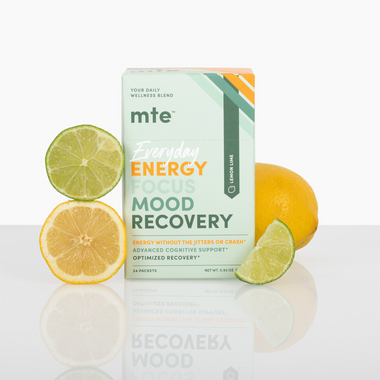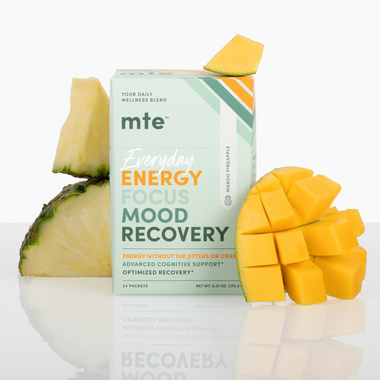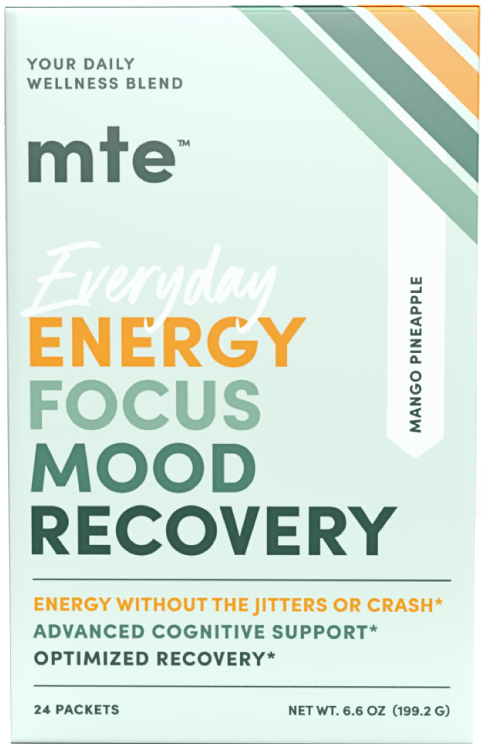
Nature vs Nurture: Can a Healthy Lifestyle Offset Bad Genetics?
In the quest to be your best self, establishing and maintaining healthy habits is absolutely key. But many of us have some not-so-great hereditary stuff going on that can make it seem hard – even impossible – to get that vibrant, healthy look and feel you’re going for. Thanks, mom. But, in the timeless and unanswerable question of nature vs nurture, recent research suggests nurture might be a more powerful force than nature. If we take the right care of ourselves, we can become more than the sum of our parts.
This little foray into genetics was particularly interesting for us, because our whole vibe at MTE is holistic wellness! Is MTE a great companion for energy, mood and focus? No doubt. Is it a magic fix for fatty food and a sedentary life? Absolutely not! Go outside and get some sunshine. Eat a salad. Have a self-care Sunday. It might do your genetics some good (and it’ll definitely optimize your MTE experience!
But first, check this out:
Genetics 101: Welcome to My TEDTalk
And we’re back with a bite-size biology crash course. Let’s get a couple terms and concepts straight so the rest of our discussion doesn’t seem snobby:
DNA vs Genes
· DNA: The molecule that holds all of an organism’s genetic information. Think of that endless double helix as a container or scaffold for all your genetic info.
· Genes: Segments of DNA that signal the production of different proteins. Think of these like countless tiny ON/OFF switches lining that double helix.
Your genes are all your genetic information/signals and your DNA holds it all together. Genes determine the way you look, develop, grow, age, and whether hereditary predispositions are expressed.
Genetics vs Epigenetics
· Genetics: The study of how traits are passed from one organism to another to study the influence of genetic variations on health.
· Epigenetics: The study of changes in gene expression (whether a switch is on or off) due to lifestyle and environmental factors.
Genetics study nature; epigenetics studies nurture. Both are used to study diseases, genetic conditions to create treatments; this includes people, animals, agriculture, and even archaeology (paleogenetics).
Mutation vs Expression
· Mutation: When the DNA sequence/structure is changed.
· Expression: Whether a gene is active or not (ON or OFF).
Mutations change the scaffolding/container, while expression refers to which genes we experience. DNA mutations can cause serious lifelong conditions and are unalterable. Genetic expression, on the other hand, is heavily influenced by how you grow up, live, work, and love.
Research Shows Your Choices Matter (A Lot)
Okay, now to the good stuff. A big reason we’ve been able to learn more about lifestyle vs heredity in the last few years is because for many lifestyle factors you need decades of observation to understand how a certain gene or habit might have affected life quality and lifespan.
These studies are huge undertakings, often involving thousands of people over several years or decades. So they’re kind of exciting when they come out:
Healthy Choices Add 5+ Years of Life to High-Risk Genetics
This 2024 study looked at 350,000+ people of European ancestry over the course of 13 years. Participants were separated via genetic risk scores of low, intermediate and high based on a clinical polygenic analysis. They were further grouped by their lifestyle choices into favorable, intermediate and unfavorable. They found:
· Those with genetic predispositions for short lifespans were 1.21x as likely to die of health-related complications as those with genetic predispositions for long lifespans
· Participants with unfavorable lifestyles were 1.78x as likely to die as those with favorable lifestyles, regardless of genetic risk.
· Those with a predisposition for a short lifespan and an unfavorable lifestyle had 2.04x higher death rates than those with long-life predispositions and healthy lifestyles.
What does this mean? This study indicates that genetics and lifestyle are independently associated with lifespan, meaning that lifestyle really does affect health regardless of high-risk genetics. Those risk levels translate to a difference in 5.5 years of life!
These researchers specifically identified never smoking, getting enough sleep, eating well, and regular physical activity specifically as lifestyle markers for longer lifespan.
Healthy Habits Stave Off Heart Disease an Extra 4 to 20 Years
A 2022 study done by the American Heart Association looked at lifestyle factors and their effects on morbidity of people with predispositions for heart disease by studying 8372 white adults and 2314 Black adults over 45 years old. They also used a polygenic risk score, but specific to variants that contribute to heart disease.
The AHA looked at the benefits of adherence to 7 lifestyle factors (LS7) – eating right, being active, not smoking, getting adequate sleep, maintaining a healthy weight, managing blood sugar, controlling cholesterol, and managing blood pressure. They found:
· Those with poor LS7 scores had a 43% lifetime chance of developing heart disease while those with high LS7 scores had a 16.6% chance.
· When controlling for genetic risk, physical activity and BMI were two of the biggest factors affecting these values.
· Those with poor LS7 scores had 4-6 years less heart disease-free than those with intermediate LS7 scores and 11-15 years less than those with high LS7 scores.
· Meanwhile, those with high-risk heart disease genes had 2-5 less years disease-free than low-risk participants.
· The risk of getting heart disease or having a heart-related event is 1 in 3 for high-risk genes and 1 in 2 for unhealthy lifestyles.
This study indicated people with predispositions for heart disease can reduce their risks by 50% simply by adhering to the LS7. The years to developing heart disease or a heart event was strongly related to lifestyle quality regardless of genetic risk.
In fact, high-risk, poor-lifestyle participants experienced heart problems an average of 20 years before people with the same genetic risks but a healthy lifestyle!
Healthy Lifestyles Slash Predispositions for Cancer Risks By 80%
A 2022 study explored the effects of healthy lifestyle on cancer risk reduction in those with genetic predispositions. They used colorectal cancer as a case study, observing around 4800 cases and 3900 controls. To evaluate lifestyle, people were given a score of 1-5 analyzing 5 lifestyle factors: smoking, alcohol consumption, diet, exercise, and body fat composition. They found:
· Lifestyle had an independent effect on risk of developing cancer, regardless of genetic risk level.
· Lifestyle choices had dose-dependent effects: those with healthy lifestyle scores of 3, 4 and 5 had 22%, 37% and 62% lower chances of developing cancer than those with a score of 1-2.
· A lifestyle score of 5 was associated with an 80% risk reduction in people with a family history of cancer.
· Every 1 point increase in lifestyle score was equivalent to a 20th percentile reduction in a participant’s genetic risk score.
· Adhering to all 5 lifestyle recommendations was equivalent to a 79th percentile reduction in genetic risk.
Basically, not only does a healthy lifestyle slash your risks of developing cancer, but the effect of healthy lifestyle choices on risk reduction is even larger in people with a family history of cancer. Simply by eating right, exercising, maintaining a healthy weight and adhering to no-smoking and alcohol consumption recommendations, you can “change” your genetic cancer risk by 80%!
You Can Become Your Best Self, No Matter the Challenge
As we’ve seen, the research strongly indicates that simply caring for yourself correctly can have a sizable effect on hereditary health risks. So what if some of the wrong switches are turned on? You have the power to go in and shut them off by living a healthy lifestyle. And on your way to it, MTE’s powerful blend of natural adaptogens, superfoods, and key nootropics can add nutrition, energy, motivation, and a bit of fun to the journey. Take a look!






